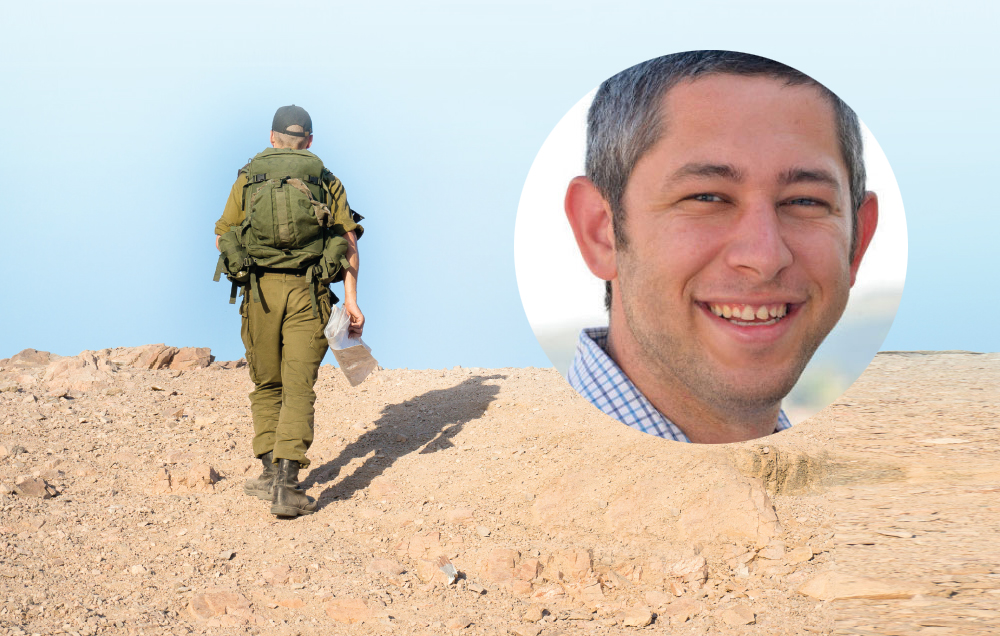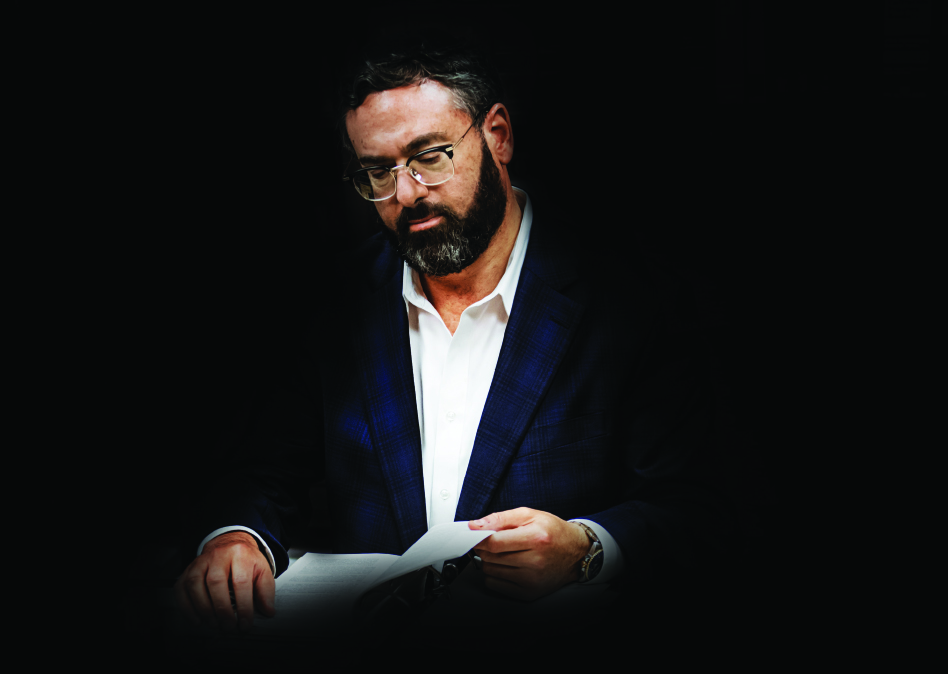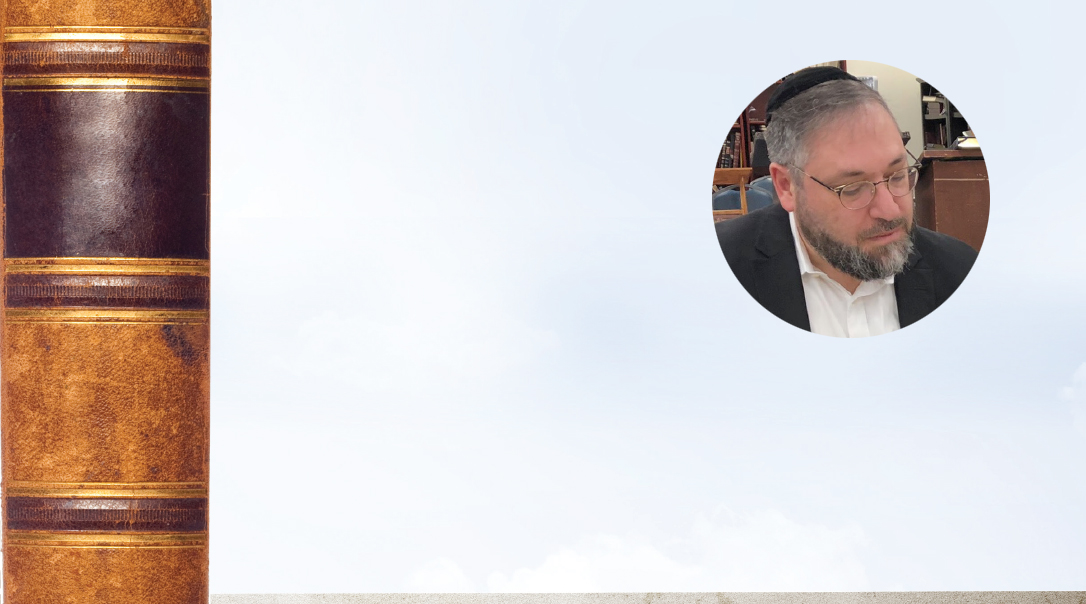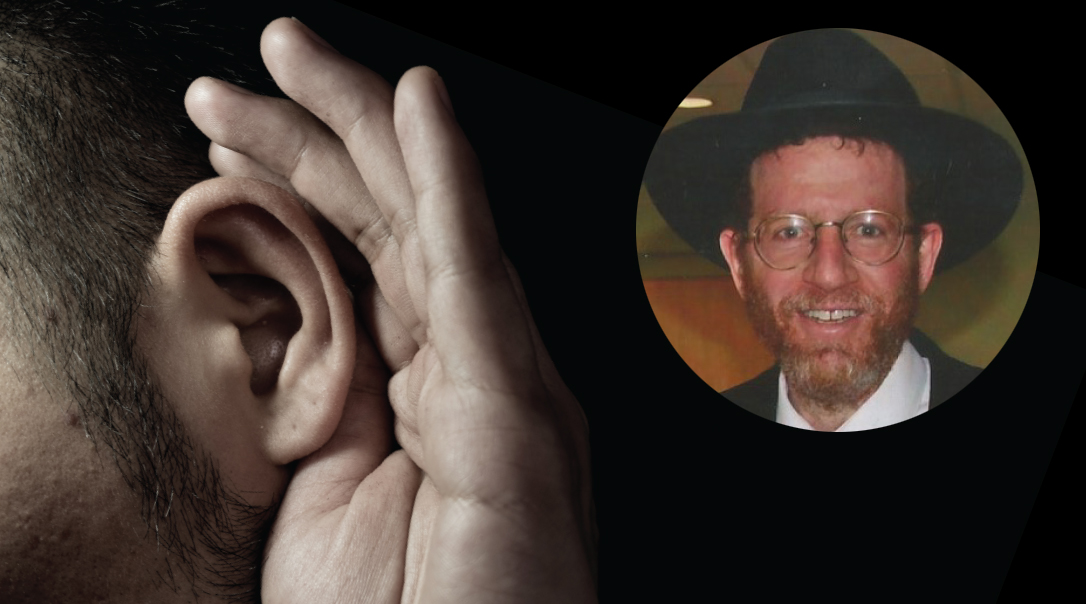At the Endzone

Whether or not we learn daf yomi, we’re all climbers, struggling one day at a time to achieve our goals

AS TOLD TO C. SAPHIR
IBy the time I graduated yeshivah high school, I knew Torah learning was not for me. I plodded through two years of beis medrash, but by age 19 I had had enough. I quit yeshivah, took a job as an errand boy and driver for a local wholesaler, and moved into an apartment with a few other working guys. I was finally free.
Soon, I moved up in the company and started working in the sales department. I enjoyed the heady feeling of earning a paycheck and commissions, and barely even noticed that my Yiddishkeit was slowly fading. Minyan stopped happening. I hardly davened, and never learned. My shemiras Shabbos was— let’s just say, borderline.
My older brother Shmuel was married and learning in a kollel in Eretz Yisrael at the time, and he told me about a young rosh kollel he knew who was visiting America to fundraise. “Can he meet you for a donation?” my brother asked.
“Sure,” I said. Coming from a family that valued Torah learning, I still had respect for Torah, and I figured that if I wasn’t learning myself, at least I could give a small donation.
In the end, I donated $500 to the kollel, which, for me, was a sizeable sum at the time, representing a week’s wages.
But when I told Shmuel about this, he wasn’t satisfied. “It’s not enough, Eli,” he said. “You need to latch onto Torah. If you donate $300 a month, you can have a Yissachar-Zevulun partnership for night seder in the kollel.”
“You’re joking,” I said. “I can’t afford that kind of money.”
Shmuel ignored my objections. “You can’t lose from supporting Torah,” he insisted.
Somehow, he got me to agree.
I didn’t trust myself to come up with $300 every month on my own, so I opened a separate account and arranged for the money to be withdrawn by direct deposit. To my surprise, I found that with the automatic transfer in place, it was quite easy to give. I didn’t feel any burden; on the contrary, it felt very good to have a connection to Torah.
As the years went by, I remained close to the kollel. I increased my donation, adding more avreichim to my roster of support, and convinced some of my friends to take on their own Yissachar-Zevulun partnerships.
Feeling connected to Torah prompted me to start learning a bit myself. My apartment was across the street from a yeshivah, and I would often schmooze with the bochurim there. Somehow, I ended up learning once a week b’chavrusa with one of the bochurim. Later, when I was engaged, I decided to make a siyum so that I could throw a barbecue during the Nine Days, so I asked the rosh kollel to find me a chavrusa. He arranged for me to learn with a young talmid chacham, and the two of us actually developed a nice relationship. After I got married, I continued learning with him two or three times a week, but that quickly petered out.
Neither I nor my wife had any real spiritual aspirations when we got married. Sure, we wanted to build a frum home, but the particulars of that were nebulous. My wife didn’t care that I wasn’t going to minyan, and she was fine watching TV shows with me. Torah learning was merely a suggestion; if it happened, great, if not, also great. Our primary concern was how we could have fun, and the highlight of our week was partying on Motzaei Shabbos. (“Saturday night,” we called it then.)
The 12th Siyum HaShas took place about a year after we got married. I thought it would be cool to attend and see 100,000 people in one place, but I had no one to go with, and I didn’t want to ditch my new wife by leaving her up in the women’s section.
A few days before the siyum, an envelope arrived in the mail with two tickets to a private box in MetLife Stadium. A family friend had given the tickets to my mother and sister, but they passed them on to us, opting to sit in the regular women’s section.
The siyum was an impressive event overall, but what really made an impact on me was the video shown of regular people from all walks of life saying, “I finished Shas.” “I finished Shas.”
Is it possible for me to finish Shas, too? I wondered. I had grown up davening in a shul of Holocaust survivors, and they were the only ones I knew who did the daf. Figuring that daf yomi was for the older generation of serious balabatim, I told myself that maybe I’d start doing the daf in my forties or fifties.
My wife was expecting at the time and wanted to leave the siyum early, during the dancing. Before turning to leave, I glanced down at the event schedule and saw that the next item on the agenda was the start of the first amud of Maseches Berachos. Not wanting to kill my chances of doing daf yomi on the very first night, I asked my wife if we could stay a few more minutes so that I could at least learn the first Mishnah of Berachos, and she agreed. With that, I started Shas.
The next day, I discovered that a bunch of my friends had also decided to do the daf, and that motivated me to continue. Within a few months, I had finished Berachos. I made a big siyum, and dove headlong into Maseches Shabbos.
Shabbos is a much more complex masechta than Berachos, and about a month into it, I was ready to give up. The Gemara was just too hard, and with each day that passed, I was falling further behind.
I called the talmid chacham I had been learning with at around the time I got married and practically begged him to learn the daf with me. Thankfully, he agreed.
I didn’t trust myself to leave the daf for the evening, as I knew things would invariably come up that would take me away from my learning. Instead, I learned with my chavrusa for an hour in the morning, in a nearby shul, after which I’d hurry to work.
I hadn’t attended minyan regularly in years, but now that I was going to shul each morning to learn, I started davening in shul. At first, that meant davening alone in the ezras nashim after our daily seder, but eventually, it meant joining the minyan before or after learning.
Making the commitment to do the daf meant that I had to structure my life around it. If I didn’t manage to learn the daf in the morning, I would not go to bed at night before finishing it. If my wife and I went on vacation, I would learn on the plane, or in our hotel room, so as not to fall behind. In the past, I would never have dreamed of opening a sefer under those circumstances, but now that I was invested in keeping up with the daf, I couldn’t allow myself to miss a day of learning.
At times I did fall behind, but one thing I never allowed myself to do was skip ahead, without making up the missing blatt. I learned the blatt I was up to, and if I fell behind, I made it my business to catch up before going further.
Once, when the daf was in middle of Yoma, I went on a one-day business trip to the West Coast. At that point, I had fallen about 20 blatt behind. I spent both six-hour flights poring over my Gemara as I sat squished like a sardine in the back of the plane, and by the time I came home, I had regained most of the lost ground. In the past, business trips had been minefields of nisayon and potential yeridah, but with the Daf front and center in my mind, they now became opportunities for additional learning.
In the beginning, my learning posed no difficulty for my wife. But when we had our first baby, it became harder for her to manage on her own in the morning, and as our family continued to grow, my absence during the busy morning hours became more and more of a challenge to her. Yet never once did she complain that I was out learning or ask that I skip my daily seder so that I could help her or be home with her. In recent years, I’ve been racing home from Shacharis to pick up my daughter and bring her to playgroup, and then hurrying back to shul to learn with my chavrusa. It’s a constant juggling act, but it works because my wife and I feel that we’re working toward the same goal.
Many times, she has wanted to go out with me, but I couldn’t go because I needed to catch up on my learning. Even then, she didn’t give me a hard time about it.
When she married me, she didn’t sign up to sacrifice for Torah, but when she saw how committed I was to my goal of finishing Shas, she gained respect for my learning — and for me. Had she insisted that I put aside my learning in favor of helping with the kids or spending time with her, I certainly would have obliged, but she actually felt proud to be helping me learn, and her steady support and unspoken encouragement gave me the space necessary to keep focusing on the goal.
After every single masechta I finished, I made a big siyum. My wife would prepare a grand spread of meats and other delicacies, and we would invite a big crowd.
When the daf finished Seder Nashim, marking the approximate midpoint of Shas, I flew with my wife and children to Eretz Yisrael to celebrate the siyum there. Marking the conclusion of each masechta in a monumental way infused me with new excitement for the coming one and invigorated me to keep going even when it was tough. No masechta was too small for a siyum.
Often, I would save my siyumim for a Shabbos that we’d be spending with my parents, and celebrate the siyum with them in order to give them nachas — my mother in particular. While my mother never put any pressure on me to be frummer than I was, even during the time when I was slipping away from Yiddishkeit, in private she undoubtedly whispered countless tearful prayers begging Hashem to set me on the right path. I’m convinced that her tefillos propelled me in the direction of Torah, because I could easily have gone hopelessly adrift.
My father, who was content just with the fact that I was frum, had never learned daf yomi, although he is a very learned man. But when he saw me, his non-learner son, poring over my Gemara on Shabbos afternoon, he decided to begin doing the Daf himself.
Learning the Daf has had other curious ripple effects over the years. The music in our house started to sound more Jewish. My wife and I started learning hilchos shemiras halashon every night. We started to read books on emunah. The conversation topics at our Shabbos table shifted from work and politics to more elevated matters. At one point, when my wife and I were in need of a particular yeshuah, we deleted our Instagram accounts and quit social media. (We got the yeshuah, and stayed off social media.) Most recently, I started davening Minchah and Maariv with a minyan every day.
All this happened subtly and organically. We didn’t make “difficult choices.” We just became different people with different priorities, and our lifestyle naturally began to reflect that.
About a year and a half ago, when the daf started Seder Kodshim, a major shift happened in my life. I began to see the endzone, and it hit me that I really was going to finish Shas. At that point, I started investing much more time into the daf, chazzering what I learned and really trying to internalize and remember what the Gemara was saying instead of merely trying to get through the Daf.
Learning Kodshim in this intensive way filled me with a feeling of kedushah that I cannot explain. All I can say is that delving into the details of the avodah in the Beis Hamikdash and the korbanos deepened the feeling of connection I had to Torah and Yiddishkeit.
In the past, when I made siyumim, my friends would often rib me, “Eli, you’re learning so much, why not start giving a shiur on the daf yourself?”
I had always pooh-poohed the idea. I, the yeshiva dropout, who had practically ditched Yiddishkeit at some point, should give a shiur on the daf?
But when I started learning Kodshim, I began to feel that I could do it. And much to my own shock, I actually started a small chaburah where my friends and I do the daf together in the evenings. Ever since then, my entire day has revolved around learning and preparing the daily shiur. I gain a lot more from the shiur than my listeners do, because I’m the one who invests all the effort into preparing it and giving it.
Today, my family and I are living as ovdei Hashem. Instead of thinking about how we can have fun now, we’re trying to build our Olam Haba. We take life seriously, and try to live every moment the way Hashem wants us to. My children are so, so proud of their Abba. And it feels very, very good.
My friends and I are hitting our thirties, and I often hear them complaining that they feel old. When I hear comments like that, I can’t help but think to myself that I feel awesome. I’m on my way to finishing Shas. And I know my learning is helping to hold up the world, day after day.
With daf yomi, there are no breaks: no weekends, no bein hazmanim, no vacation days. I’m never off; I’m always connected.
I still work full-time, and I’m just a regular balabos, not a kollel yungerman or a yeshivah guy. But today, I’m also something else.
I’m a Shas Yid.
(Originally featured in 'One Day Closer', Special Supplement, Chanuka/Siyum HaShas 5780)
Oops! We could not locate your form.







